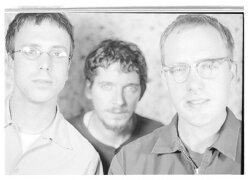Puritans take to the air
Thirty or so (would’ve been more, possibly, except, I was told, for the fire code) invited acolytes made the pilgrimage to Channel 13’s studio at CATEC on Rio Road to watch and take part in an hour of live, broadcasted Puritanism. Hosted by a vaguely Village People-esque Stevie Jay— unshaven, and sporting a tight black tank top and a navy blue knit winter hat, looking like a cross between a construction worker and a stevedore— the performance may also prove to be the basis of an in-the-works Puritans DVD.
Team Puritan did what they could to control the controllable variables to get the desired-but-tricky televisual result, i.e., to get the band to translate. Since attendance was invite-only, the level of enthusiasm was pre-programmed. If you were there, you probably knew and liked the band, maybe even personally. It was the audience’s job, and Jay’s job to make sure the audience knew it, not to fake enthusiasm necessarily, but to make its enthusiasm exceedingly evident. The buffet didn’t hurt either.
Aside from Jay’s exhortations to get up, get down, and bring the noise— which he kept good-naturedly brief— and some do’s and don’t’s— do pack in as close to the front as possible, don’t cross the duct tape line keeping people from getting between the Puritans and the cameras— things felt casual and familial. Like a semi-formal, semi-secular event (wedding reception, bar mitzvah), all ages (from fresh-faced high school girls to middle-aged moms to gray-templed gentlemen) mixed the propriety of expectation with, well, fun.
Nobody seemed especially nervous. After a few songs, band and audience settled into doing what they do best, rocking and being rocked. Save for the cameras, things felt more like a basement party, as people swayed and bopped in eyes-closed ecstasy while others took time out for party snacks. Catching glimpses of the live feed in the control booth next door, I saw that it looked like a basement party, too. Intentionally or otherwise, the producers gave the show nostalgic curves.
A band that can write a Ramones-go-country song that features the line “I wanna slap that ass and ride forever” obviously doesn’t go in much for pretense, but the American Bandstand feel to the thing only highlighted their innocence. As the hour sped to a close, the band began to pound songs to the mat, and the guitar’s Brit-pop jangle couldn’t mask the band’s punk backbone, slammed down on the drums with authoritative force. It was a wholesome banquet entirely open to crashers.
Currituck County, Aden, and True Love Always at Tokyo Rose
Friday, March 15
Used to be, bands on Teenbeat, the Arlington indie label founded and managed by Mark Robinson, made pop songs that looked at you funny. Robinson’s own efforts always stood up front, from Unrest’s defiantly peripatetic reference to Air Miami’s glossier but just as singular odes to things like World Cup soccer to Flin-Flon’s cartography-fueled rhythms.
Far from a vanity project, though, the label was home to bands like Versus, Blast Off Country Style, and Tuscadero. These bands made music as fiercely personal as D.C.’s Dischord Records, though usually with a more introspective aim, and a better sense of play. The Teenbeat delegates this evening— Currituck County, Aden, and True Love Always— made a quieter impression.
Currituck County has a population of one, it being the alias for Aden’s guitarist, Kevin Barker. Seated, slight, Barker crouched over his acoustic and did his best not to draw attention to himself. Which was too bad, especially because it mostly worked. As he finger-picked his way through a handful of hushed numbers that bore more than a passing resemblance to Nick Drake’s songbook— as quietly as he played them, they could’ve been Drake tunes, for all anyone knew— he seemed to apologetically and physically shrink back.
When his Aden bandmates joined him on stage, their manners were a bit less self-effacing, though Aden’s performance begged the question: if you upstage your band so quietly no one notices, does it really matter? Aden tiptoed through amplified material that made you wonder why they plugged in at all. Though more upbeat, Barker’s and singer Jeff Gramm’s guitars sounded even quieter. They picked and strummed, but sound wasn’t always immediately evident.
Though he seemed just as happy to be there with his bandmates as he did performing alone as Currituck County, Barker in his solo guise proved more singular. On the acoustic, his finger-picking was adept, but more about drawing up warm blankets of sound than lying down in any folk idiom. And like Drake, that sound was mournful and nostalgic, but warm and loose, like sunrays setting under thunderclouds.
Aden’s imprecision, if sharpened, might not sound all that different from True Love Always’ exact precision. There’s something martial to TLA’s pop minimalism. Tony Zanella snaps off bass lines like thick bark from a tree, and John Lindaman’s vocals and guitar tone are aggressively, consistently loungin’ in that Burt Bacharach way.
True Love Always makes eyes at delicate melodies and goes steady with delicately toned tissue paper chords, but it’s their drummer who’s the real looker. Matt Datesman can sound like a drum machine, but his efficiency’s more kinetic than all that. He peppered his kit with a light touch, suddenly packing explosiveness into tiny, unexpected nooks in the rhythm that only he seemed to know to look for. His was the most distinctive voice of the night, pleasingly off-kilter, and not afraid to draw attention to itself.
